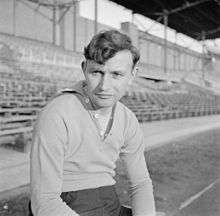Abe Lenstra
 Lenstra, photographed in 1951 | |||
| Personal information | |||
|---|---|---|---|
| Date of birth | 27 November 1920 | ||
| Place of birth | Heerenveen, Netherlands | ||
| Date of death | 2 September 1985 (aged 64) | ||
| Place of death | Heerenveen, Netherlands | ||
| Playing position | Striker | ||
| Senior career* | |||
| Years | Team | Apps | (Gls) |
| 1936–1954 | Heerenveen | 500 | (523) |
| 1954–1960 | SC Enschede | ||
| 1960–1963 | Enschedese Boys | ||
| Total | 730[1] | (700) | |
| National team | |||
| 1940–1959 | Netherlands | 47 | (33) |
| Teams managed | |||
| 1946–1947 | Heerenveen (player-coach) | ||
|
* Senior club appearances and goals counted for the domestic league only. | |||
Abe Lenstra (November 27, 1920 – September 2, 1985) was a Dutch football player and national football icon in the 1950s. He was also a Frisian legend, most notably with the club where he made his name as a football player, Heerenveen.
Career
Lenstra played for a host of clubs such as SC Enschede, Enschedese Boys, PH: DOS '19, WSV, DOS Kampen and vv LTC. However, it was with VV Heerenveen (the previous name of current day SC Heerenveen) where he first was selected for the Dutch national team. When in 1954 professional football was introduced in the Netherlands the already 33-year-old Abe Lenstra moved from VV Heerenveen to the bigger SC Enschede. It was in Enschede where he missed his best chance of ever winning the Dutch title: in 1958 SC Enschede lost the first and last Eredivisie final ever after 180 (!) minutes from DOS Utrecht. In 1960 he made the move to the rivals Enschedese Boys, where he ended his professional career in 1963.
With the national team, for which he played a total of 47 caps scoring 33 goals,[2] he struck a partnership with other internationals such as Faas Wilkes and Kees Rijvers. He was known to stand by his principles and objected to play for the national squad if he was not selected for the position he favoured.
It was Lenstra who put the name of SC Heerenveen on the footballing map, where the club was also fondly referred to as 'Abeveen'. In 1977, long after he retired from football, he was diagnosed with having a brain haemorrhage and spent the remainder of his life using a wheelchair. He died in 1985, just a few days before the first ever international match in the stadium that a year later would bear his name.
Legacy
Today, his name has been closely associated with SC Heerenveen and its stadium: The (first and second) Abe Lenstra Stadion has been named in his honour as a lasting memorial to this Dutch football hero.
Honours
Club
- Heerenveen
- Northern First Division: 1941–42, 1942–43, 1943–44, 1945–46, 1946–47, 1947–48, 1948–49, 1949–50, 1950–51
- Netherlands Football League Championship Runner-up: 1946–47, 1947–48
- SC Enschede
- Eredivisie Runner-up: 1957–58
Individual
- Netherlands All-Time Top Scorer: 1958–1959[3]
- Dutch Sportsman of the Year: 1951, 1952
- Netherlands Football League Championship Top Scorer: 1946–47, 1947–48
External links
- Abe Lenstra at sc Heerenveen official website (Dutch)
References
Yme Kuiper, 'Abe Lenstra (1920–1985). Van Us Abe tot nationaal idool,' in: Fryslân, Nieuwsblad voor geschiedenis en cultuur, jg. 6 (2000), nr. 2, pp. 50–53. Online site
- ↑ http://www.sc-heerenveen.nl/club/historie/abe-lenstra
- ↑ "Abe Lenstra - Goals in International Matches". The Rec.Sport.Soccer Statistics Foundation. Archived from the original on 2013-03-14.
- ↑ "Archived copy". Archived from the original on 2013-03-14. Retrieved 2014-04-18.
| Awards | ||
|---|---|---|
| Preceded by None |
Dutch Sporter of the Year 1951 to 1952 |
Succeeded by Arie van Vliet |